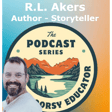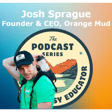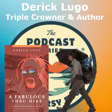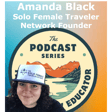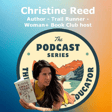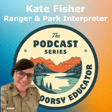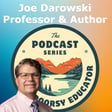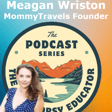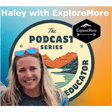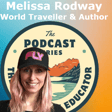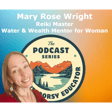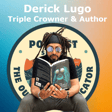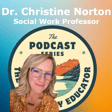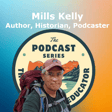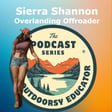Become a Creator today!Start creating today - Share your story with the world!
Start for free
00:00:00
00:00:01

Aimee Frazier
Join Alasdair This week as we talk about the merging world of counseling and the outdoors. Aimee's mission it to create experiences- indoors or under open sky, that empower us to reclaim our stories, deepen self‑understanding, and cultivate lasting mental health
Recommended
Transcript
Introduction to the Outdoorsy Educator Podcast
00:00:01
Speaker
Hello and welcome to the Outdoorsy Educator Podcast, a place for conversation about travel, adventure, life lessons, and making the most out of each and every day.
00:00:14
Speaker
I'm your host, Alistair Green, and each week I will have a conversation with someone who will not only inspire us all, but give us an insight into living life to its fullest.
Spotlight on Whole Earth Provision Company
00:00:25
Speaker
But before we get started, a quick warrant from our sponsor, Whole Earth Provision Company.
00:00:38
Speaker
Since 1970, Whole Earth Provision Company has been the Texas outfitter for side quests big and small. Whether you're gearing up for the open road, chasing a trailhead, or hunting for that just right gift, they have got you covered.
00:00:53
Speaker
Think durable clothing, shoes that will actually go the distance, gear that's road trip ready, and books, puzzles, and toys that will spark wonder at every age.
00:01:05
Speaker
You'll find Whole Earth in Dallas, Austin, Houston, and San Antonio, or anytime online at wholeearthprovision.com. And hey, because you're rolling with the Outdoorsy Educator podcast, here's a little extra love.
00:01:19
Speaker
Use the code OUTDOORSYEDU for 20% off your next adventure at Whole Earth.
Meet Amy Fraser of Portland Hiking Therapy
00:01:32
Speaker
And on this week's episode of the Outdoorsy Educator podcast, we have have Amy Fraser. Amy, how are you today? I'm good. Thanks so much for having me. Absolutely. We connected through a mutual friend, Andy Neal. um Many of you will know Andy Films and Hikes, but I'm really looking forward to finding out more about what you do, Amy. But first of all, why do you just tell us a little bit about who you are?
00:01:55
Speaker
Yeah, so I am in Portland, Oregon, and I own a private practice called Portland Hiking Therapy, where I am a mental health therapist, an LPC, and I conduct the majority of my sessions outside hiking while doing mental health.
The Benefits of Nature in Mental Health Therapy
00:02:10
Speaker
therapy. And it's unique. It's a little bit different. We're often here in Portland, it rains like nine months out of the year. Today's a sunny day, but most the time it's raining.
00:02:21
Speaker
And so it's really, it's really different. We have a focus on nature connection through our sessions, which the research is ah showing more and more positive impacts on mental health for eight ah spending time in nature and physical movement.
00:02:37
Speaker
And so we're using those things to our advantage while we're doing elements of traditional therapy and eco therapy while we're out in the forest. That was the thing that jumped out at me when I had to look at your instagram Instagram profile initially was how do you blend those two worlds? Because in my head, they're quite separate, but I'm also imagining they're not the sort of traditional counseling and then this out outdoor therapy. um how How do you combine those two worlds?
00:03:02
Speaker
That's a great question. um I think you know when we usually start our sessions, people are driving into the trailhead from traffic and from the city. and Right.
00:03:12
Speaker
So we often start our sessions by doing some type of meditation. There's a log not too far down the trail trail where we'll sit and just notice the shifts in our bodies.
00:03:24
Speaker
as our nervous system reacts to our environment. And typical typically this is like, oh, like I can feel the muscle tension shifting or I'm connecting with birdsong in my nervous system.
00:03:36
Speaker
appreciate that, you know, i feel a sense of safety, or I feel like I can slow down, or i feel like I can breathe for the first time in a long time. And so just noticing that contrast is kind of the the starting point. And then from there, once we get walking and talking, that's where maybe some of the more traditional elements of therapy may come in of, hey, let's reframe a thought, or let's come up with a small step for this next week that pushes that you out of your comfort zone a little bit, you know, things like that, that that you might in an office. Right.
00:04:01
Speaker
i've ah You've sort of answered the next question that was just coming into my mind is, you know, you mentioned a a brief meditation sort of before the hike. um You know, hiking therapy could just be let's go for a walk, but obviously there's a lot more to it than that. um You do some meditation. what what What are the other sort of ingredients of um going for, you know, a sort of mental health hike
Therapeutic Techniques in Nature-Based Therapy
00:04:24
Speaker
with you? Mm-hmm.
00:04:27
Speaker
It really depends on the person, but some of the other techniques we might use would be like expressive metaphors. so Let's find something in nature on the side the trail that represents your relationship with your mom.
00:04:40
Speaker
and This could be a tree that's cracked all over, or maybe it's a... I don't know, a pile of horse poo, you know, just right right things that could symbolize. and And for some people, it's easier to project an emotion or a story or an experience onto something in nature than it is to talk about it directly. And so that can kind of crack the door open and let the ego step aside so we can explore a little bit more in depth that way.
00:05:06
Speaker
um So there's, you know, there's that piece or we could explore how different seasons impact the different emotional states like, hey, every fall, I can feel this depression setting in or every holiday, this family pattern repeats.
00:05:20
Speaker
And so we can do some type of like, eco seasonal mapping or, you know, just different things that help us relate to nature and also help us do some internal process work. That sounds really interesting. I've got so many thoughts and questions going through my head. But how did you get into this from a personal point of view? Obviously, you're a licensed counsellor, but did you enjoy High Kick? And then you thought, how can we combine this? Or would did you have some sort of mentor or inspiration in this field?
Amy's Journey to Outdoor Therapy
00:05:47
Speaker
o Hmm. I've always loved the outdoors and I was a cross country runner in high school and my coach would take us out to um different trails and different lakes. And so I feel like that was ah huge opportunity to begin feeling safe and comfortable outside. And I know not, not everyone has those types of experiences experiences,
00:06:06
Speaker
um you know, have the the privileges to feel safe outdoors. So that was kind like the doors cracking open. and then when I was in college, i I got the opportunity to guide for a nonprofit where we took teenagers, whitewater rafting and rock climbing, and we would do challenge courses and we would live outside the vast majority of the summer alongside these groups.
00:06:25
Speaker
And I got to witness how transformational these experiences were for them. So they were sharing stories or stepping out of their comfort zone or developing their leadership ability, connecting with people in new ways.
00:06:37
Speaker
through these adventure-based experiences. So very much like it's experiential education, experiential learning that was taking place. And that really, it was so beautiful and awe-inspiring to not only get to facilitate these experiences, but also myself as a facilitator be transformed through the process of supporting others in the outdoors.
00:06:58
Speaker
So I knew if there was ever a chance in the future that actually paid money, that would allow me to integrate the outdoors as a part of the transformative process for people that I wanted to move in that direction. And I spent the decade in higher education, um mostly in like advising, recruiting type roles and also teaching. I taught a hiking and backpacking class, career.
00:07:21
Speaker
but came to realize after 10 years in that field, like, hey, I think I'm actually supposed to be a therapist. And I was able to find a supervisor that supported outdoor work. He specializes in ecotherapy and the rest was kind of history.
00:07:34
Speaker
so I mean, that's the most Portland thing you could say that you taught hiking and backpacking in higher ed. I think that's just fantastic. i think it's the best the best class out there. I think I've got take it. Without a doubt. Without a doubt.
00:07:48
Speaker
So is there a sort of a a trend or a movement towards this in the counseling and therapy world?
Walk-and-Talk Therapy Post-Pandemic
00:07:54
Speaker
Are people seeing the data? They're seeing that this is really a beneficial thing for their um the clients to do?
00:08:03
Speaker
I think so. think there was some hesitancy pre-pandemic because there is additional physical liability. We're out and we're moving and have to be really careful with things like confidentiality and best practices.
00:08:15
Speaker
But I think the pandemic fast-tracked walk and talk therapy as a viable option because it was more accessible to meet a client outdoors than it was to risk getting COVID, being inside a small office. Of course. closed And so that was...
00:08:32
Speaker
really ballooned the interest in this field. And even though now things have shifted, um i think there's a lot of therapists who are recognizing my mental health feels better. I feel less burdened at the end of the day. I'm having less vicarious trauma from the stories that we're um witnessing and supporting people through.
00:08:51
Speaker
And so i think it's It's only expanding from here. And there's more resources now. There's books on how to integrate walk and talk therapy. The American Psychological Association just came out with the best practices article that I got to be a part of.
00:09:05
Speaker
And so now I think more um psychologists, psychiatrists, mental health therapists are going to feel a lot more comfortable moving in that direction. Yeah, just from my very limited perspective, you know I follow a lot of people in the outdoor industry, things like that.
00:09:21
Speaker
And there does seem to be definitely a movement of combining these fields. And i suppose it will just continue to grow. The more data, the more research people do.
The Appeal of Outdoor Therapy
00:09:30
Speaker
um And I shared with you before we came on the air Many years ago, I went to therapy and I remember my initial hesitation was I'm going to be sitting on a couch, sitting opposite somebody in a clinical setting and we're just going to be staring at each other and it's going to be very awkward and difficult.
00:09:48
Speaker
Now, it wasn't like that, of course, you know, that it was a warm, welcoming place. But the thought of having something to do while you're talking is very appealing to me and seems to make it just more welcoming and accessible.
00:10:04
Speaker
Yeah, I think there's a good part of the population that doesn't it necessarily want traditional sit on a couch, direct eye contact therapy. They want movement or something that feels natural or already a part of their maybe identity. And there are certain populations that but really seek me and my practice out specifically for that reason. um So yeah, I don't think it would be you know for every single person out there. But for a lot of people, it makes therapy more accessible.
00:10:32
Speaker
Yeah, I think so. Certainly for me, like I said, less intimidating, um I think. I suppose it it's the same if you just needed to catch up with a friend, going and doing something with them, and then you can do that thing together while you're talking.
00:10:46
Speaker
um I don't know, it just seems like a wonderful, wonderful thing in it. It reminds me of forest bathing, other other sort of therapeutic uses you know that people do in the ah outside outdoors, um which is something that I haven't done at all, but is really interesting to me, and I'd like to find out more.
00:11:04
Speaker
Yeah, I think there's a lot of elements that a lot of therapists integrate, pulling from the research from forest bathing. Right, and this combining what I assume are sort of maybe perhaps newer methods in the counseling field with these traditional, let's just go for a walk outdoors, the word has escaped me, but combining the old and the new just seems like a really good idea. Yeah, and I think with with AI coming out and you know these digital platforms, therapists are going to need to innovate and offer things
00:11:40
Speaker
in really like novel or engaging ways that like AI isn't going to be able to keep up with. And so I think it i think this will continue to expand as therapists recognize that we we have some competition, unfortunately, and connecting with nature and being a part of this like ecosystem that we've always existed within but sometimes failed to recognize is a really powerful tool that we don't utilize quite enough.
00:12:07
Speaker
I
Technology Limitation and Nature Connection Trend
00:12:08
Speaker
think you're right. I was actually listening to a different podcast about something else altogether earlier today, and they were discussing whether this this sort of very young generation, teenagers these days, are going to be perhaps the generation that pushes back against a lot of technology.
00:12:24
Speaker
um And they were talking about as there's been a slight increase in flip phone sales. And people, you know, there's a slight trend of people removing apps from their phone and just just giving a gentle nudge back to the fast-paced world of technology.
00:12:40
Speaker
And there was just it was a casual conversation of whether this could turn into a wave pushing back and getting back to nature or not. Will this just be a small thing? But I don't know. To me, there's something there.
00:12:52
Speaker
Yeah, yeah, I love that idea. And I think it's a it's a really important and empowering step that people can set these boundaries limitations with technology or access to the media, because those can have a really profound impact on people's sense of well-being and safety and security within the world.
00:13:09
Speaker
And so yeah, I'm excited for the new generation and to see how that how that plays out. Yes, yeah, it plays out. I was at the gym couple of months ago, and I just had one of those moments where the light bulb went off. And I go to Planet Fitness, which most people be familiar with, all the machines, and then they've got a line of televisions with all the different channels.
00:13:28
Speaker
yeah And there was ah television news channel that's more left-leaning and then one that was more right-leaning on two televisions side-by-side telling the same story. And I was just just blown away, like just looking at the verbiage that is used.
00:13:44
Speaker
And i was like, this is just not healthy at all to consume either of those for me at this point of my life. It's just, it's it just that was as as suppose many of us have a moment in our lives where we step back and that was certainly mine. And I'm sure you have talked and dealt with people that have had those kind of moments.
00:14:03
Speaker
Yeah, yeah, a whole lot. And it's so important that we can get away from some of the toxic or difficult elements of our culture and reconnect with ourselves and the land.
00:14:16
Speaker
And like, for some people, even a sense of spirituality, you know, being outside, you can really pull us out of our own minds our own stories as we're immersed in like the bigger landscape of mountains that are millions of years old.
00:14:31
Speaker
And recognizing like can bring about a lot of existential reflections for some people to
Amy's Personal Growth Through Hiking
00:14:37
Speaker
recognize and put in perspective just um have different things that we might experience on the day to day that are normalized in our culture but aren't necessarily healthy.
00:14:46
Speaker
Right. And that's something I've found. um i can think of a particular moment. It was a year. It was just about a year ago. I went and did the New Jersey section of the Appalachian Trail.
00:14:58
Speaker
And you don't, I knew that I needed it and I needed to just get away for a few days. And my in-laws live up there and went and saw them and then went hiking. that suddenly when you really are without the phone at your fingertips and the bings and the emails and the this and the that, your mind really does just, it's like turning something that just allows it to decompress.
00:15:19
Speaker
um And I was kind of unaware of it happening until it happened. um I was like, I need it, I need this, and we all need this. and Yet we don't give ourselves enough time to just be.
00:15:33
Speaker
um So I'm very excited about what you're doing. um Is this kind of more, i hate the word trend, but I can't think of a better, a movement. Is this sort of a local thing that you found in Portland? is it more national or international?
00:15:47
Speaker
Have people reached out to you or have you reached out to people around the world who are doing something similar?
00:15:55
Speaker
I think there are a lot of places where like outdoor walk and talk or hiking therapy is prevalent. I think the East coast actually has ah more from what I understand with the national conferences that I attend the East coast. It's become normal a little bit quicker. And there's, think maybe a bit fewer practicing that here in the Pacific Northwest, but I think that's changing.
00:16:17
Speaker
And I can consult with a lot of therapists and they're kind of on the brink of turning their practice into integrating walk and talk therapy. And so, yeah, I think we're catching up here on the West coast and then internationally, i think, yeah, there's people in like the UK and Australia, New Zealand, kind of all around the world that are are taking interest or integrating nature and in some way into their practices, maybe not necessarily always walking and talking, but, you know, getting into like nature-based therapy or, or different modalities like that.
00:16:47
Speaker
Yeah, it's just occurred to me, and I can't quite believe it it's occurred to me right at this moment, but um I work for a university where I'm a professor, and our chancellor, ah there's there's a day and a time every week where she says, I'm going to be at this spot, and I'm going to walk.
00:17:02
Speaker
I can't remember if it's one mile, two miles, anyone is welcome to come and join her. Oh, wow. I love that. And just chit-chat. There's no agenda. there's no the bit You will know I'm going to be here at this. I think it's at one of our fountains.
00:17:15
Speaker
At the fountain at, let's just say, 10 o'clock on a Tuesday, I'm going to walk. Come join me. um and it's it's And it just occurred to me that she's literally doing the same thing. And we're in a fairly urban setting here, even though our campus is quite lush and green.
00:17:32
Speaker
But she's doing the same thing. because She's just doing it in the in a where she can, in the environment where we live and work. Yeah, I love that. There's some really good research that shows how we bond socially through hiking itself, right? Or move some of these like relational inhibitions that we might have because we're not making direct eye contact. We're navigating this shared experience. so we have to oftentimes like problem solve. going to get around this log? Are we going to choose this trail or that trail?
00:17:58
Speaker
And so it builds... these social relationships, it and enhances the building of these social relationships. and And I love that. And I think that's like really unrecognized and really undervalued.
00:18:10
Speaker
And you know I hope that people can take advantage of that, right? Maybe if you're a little more shy or introverted or socially anxious, like go for a hike with someone, invite them out or join join a hiking group because that's such an an easy way of connecting compared to maybe you know going out to coffee or something that feels a little more direct.
00:18:29
Speaker
Yeah, absolutely. no I love it. I love this this movement, this wave that's happening. um So we've talked quite a bit about you as a counsellor and what it's given you as a professional, but hiking, what's it given you on a personal level or the outdoors?
00:18:44
Speaker
How do you feel it's maybe changed you as a person? Oh, I love this question. I wish I'd prepared more for this. Sorry. Yep, throwing at you. I would say for me, there's a whole lot of personal growth that has taken place through different hikes. I'm also a mountaineer, so for me, climbing mountains is, it feels really empowering. And I think one of the ways it does that is through like almost like symbolically, like when we're hiking, when we're climbing a mountain, it's really challenging. terrain is steep, there's a lot of uncertainty. While we wanna be prepared, we can have some amount of control, but we have to be flexible.
00:19:25
Speaker
And so I think, you know, being able to do a difficult hike or stand on top of a mountain summit I through that experience, like internalize this narrative of like, I can do difficult things, I can be resilient, I can get lost and still be okay and find my way.
00:19:41
Speaker
um i can not be in full control of my environment, but be prepared and trained and confident that I can cope with things on the fly. And so I think a lot of these messages that we learn through the trials and challenges of hiking or climbing um can become internalized to symbolize some type of like personal growth.
00:20:02
Speaker
So I think for me that's kind of it. and there's like spiritual layers in there or social layers. um Like I think those are important too, but probably from like the personal growth standpoint, that's the ah piece that feels the most exciting, exciting for me.
00:20:19
Speaker
And I love that, I mean, we've been talking for 20 minutes and already two or three times the the metaphor, the relationship between the lives we're living and the natural world has come up time and time again.
00:20:31
Speaker
um and I love that. I love that because it's something I think about a lot, about yeah situations. I've gotten lost when hiking and had to figure it out. And I think about that quite a bit when i get into situations in my day-to-day life and I remind myself that while I've been through difficult situations, it's always worked out. Maybe not the way I thought, maybe not how I planned, but I've always got there in the end.
00:20:55
Speaker
and And this, the whatever situation or predicament I'm in at that moment is going to be the same. I'm going to get, um um it's going to be okay. Um, So I love that that's kind of been the theme of this conversation.
00:21:10
Speaker
What do you feel like, as we kind of get towards the end here, wrapping up, um your long-term goals for hiking therapy, um where do you where would you like to see it go the next five years, 10 years, as this hopefully continues to grow?
Future of Hiking Therapy in Systems
00:21:24
Speaker
That's good question. There was an article recently, it was this week, just a few days ago, on the Washington Post, about i don't know, maybe you saw this. This woman, instead of she's a teacher. Instead of doing detention, she offers detention hikes. personally I saw it and reposted it. I may stolen from you. i don't know. but Okay, yeah. so it yeah fascinating I was so excited that she and others are witnessing students coming together, processing their experiences, and really actually enjoying these hikes and right so experiencing like the personal growth that can come with that.
00:21:59
Speaker
Um, so as far as like the growth of hiking therapy, i don't know if that would even fall under the umbrella of hiking therapy, but it's people supporting their wellbeing through getting out of nature and hiking. And I love seeing that. And I would love to see that normalized in like school systems and healthcare care systems, um, you know, like community groups that are going out to hike.
00:22:23
Speaker
I think nature connection is is really important and something that we've really drifted far from the last 100 years or so. And I think there's so many benefits that we could gain from re-engaging with that.
00:22:36
Speaker
So yeah, I would love to see things like that happen in my own practice. you know I would love to be running more hiking groups, love to be working with different populations and helping train other therapists to be able to offer that as well and and feel like they're competent and trained to to do that in a ah way that's safe for everyone.
00:22:53
Speaker
I love that. We've sort of lived slightly parallel lives in that regard. My last several years in the elementary public school setting, I was a behavior specialist. And a lot of the time, you know, had to intervene with children who are having behavior issues for whatever reason.
00:23:10
Speaker
And as long as the weather allowed, I hated sitting at like across the desk from them. And yeah again, is harking back to talking about sitting down with the counselor and imagining it being clinical and awkward.
00:23:22
Speaker
We could just go outside and and kind of sit across from each other playing with sticks and leaves and just have a gentle conversation. And it was its it's still one of the most rewarding things I've ever done.
00:23:36
Speaker
And yet it's so simple. It's so simple. And that's what we kept coming back to. None of this is complicated or needing special equipment. you know kids Kids just want to be outside and in nature.
00:23:48
Speaker
um So i love that we've seen some very similar things. yeah Yeah, yeah. Have you heard of 1,000 Outdoors? i've I've heard of it, but that's about it.
00:24:00
Speaker
It's a part of the podcast, right? Yeah, I think it's a podcast. It's a book. I think it's a Facebook group, perhaps. I see things for them everywhere. But yeah, it's this idea of families spending 1,000 hours outside per year and tracking there their hours.
00:24:15
Speaker
And that's it's a lot of time, you know, like camping trips and being out flowers every day and just noticing the difference of the shift of the kids and the families and their bonding and their mental health, just all these things that can result from those experiences. And i that's a movement I would love to continue to see, um you know, expanding.
00:24:34
Speaker
Yeah, I've actually had somebody, was at a conference this Monday and Tuesday, and on Monday, somebody came up to me because the we we know each other a little bit through um our work, and she knows them very enthusiastic about the outdoors.
00:24:48
Speaker
And she is really considering pulling her children out to public school for one year and traveling with them and homeschooling on the road and was asking my initial thoughts about it.
00:25:00
Speaker
I think her situation was she's... married her husband would stay home and she was going to take off with the kids and he'd fly and meet them and um but she just sort of said is this a good idea or a terrible idea um and it's well i'm biased i think i think it's a tremendous idea what an opportunity um to for your children and for you to have that um And she she comes from a very academic family where you work and you work and success is defined by the size of the house and the type of car.
00:25:35
Speaker
And she wants to break away from that. but yeah And so it was a really interesting conversation. and I feel it's happening more and more. Yeah. Yeah. I think there are some cultural, some some people questioning some of the cultural narratives that we have. Yes.
00:25:50
Speaker
At least here in America. And yeah trying to make space to live before they are retired and, you know, maybe their ability level shifts. and yes and And I think people are, you know when we have the privilege or the stability to be able to do something like that, I think trying to make the most of it in most situations is really smart.
00:26:10
Speaker
Yeah, I think so. And she's, again, to to get to know her, you wouldn't think that would be something. um She's great. She's five foot nothing and drives a massive tunnel to Tundra and things like that.
00:26:24
Speaker
Like, she's she's great. and She loves being outside, but is just scared. i said, you've got this. You can you can do it. um So it's super exciting. um But yeah, more and more people have come up to me and said, how do we do this? How do we teach our children about the outdoors?
00:26:40
Speaker
um So hopefully the beginning of a trend. um As we kind of wrap things up, I do always ask, I've got a list of questions. I'm going to choose three to ask you um I promise I'm trying not trying to put you on the spot too much.
00:26:55
Speaker
um But I'd love to know how you define success and how has it changed over the course of your career? Oh, success. Yeah, how do you view success? Like self or just in general? Whatever whatever comes to you.
00:27:11
Speaker
Hmm. I would say success.
Defining Success in Life and Therapy
00:27:15
Speaker
And I'm going to do this from the hat of a therapist because I work with so many different people. So I'm going to try to make this a general answer.
00:27:22
Speaker
Right. For the ability to live authentically according to one's values. I love that. Yes.
00:27:32
Speaker
I know that's really broad, but... no you know Everyone makes meaning of life and experiences so vastly differently. And so I think when we can be authentic and be in alignment with what is most fulfilling or gives us a the best sense of purpose and alignment with but the values that we hold, i think that's got to be it.
00:27:52
Speaker
ah I love that. Purpose has been a big thing in my life, trying to find it. And, you know, I could have done something else. I could have made more money. I could have this, but I know I'm doing exactly what I'm supposed to.
00:28:04
Speaker
And that's a great, great feeling. Yeah, I think, yeah, I admire that. I admire when I can like chat with people and see that they are doing the one thing that they feel like they were created to do.
00:28:16
Speaker
I get so excited to be around them yeah because there's no better spot in the world for them than right there. Yeah, it's, it's ah it's and how lucky am I? And then I feel the need to, try facilitate that for other people if I can um through my work and education, help them find you know their purpose.
00:28:32
Speaker
The second thing I'd like to ask you, if there's any book or piece of music that jumps out as being most impactful in your life? Oh, most impactful book or music.
00:28:46
Speaker
That's a great question. I'm like spending my books right now. I've got books in my office. I should have said books, music, or film, if there was a film. Anything like that. Oh, most impactful.
00:28:58
Speaker
ah there's got to be one yes There's a lot of good books. This one comes to mind because I read it recently and it shares the the ah theme of education, which is a part of both of our worlds.
00:29:11
Speaker
So I think it's called Educated. Have you read that one? I've not, no. It is so fascinating and it was really popular a few you years ago. It's this woman who...
00:29:23
Speaker
was raised very isolated in Idaho. She was homeschooled her whole life. And then she got into college and broke free from a lot of difficult elements of her life. So she has this like trauma piece that she's coming from and emerging out.
00:29:41
Speaker
And she went to school, I believe it was in the UK, very prestigious school. I'm spacing on which one right now. But then she became a professor. And it's it's ah it's really beautiful. So I'm going to say that one.
00:29:55
Speaker
ah Somebody has told me about that book before because um there's little bits of the beginning of the story I'm familiar with. So I think somebody's told me a little bit about the trauma this this lady went through um and the situation she grew up in. It sounded terrible, but I've not read it.
00:30:11
Speaker
So now that you're the second person, that has to go on the list of books to read. Yeah, take it out. I think you'll enjoy it a lot. The power of education to transform her and her life and facilitate her healing, it's really beautiful.
00:30:25
Speaker
I love And my final question for you is if you could go for a hike with 10 miles with anybody in the world, dead or alive, somebody you know or don't know, who would you like to go hiking for 10 miles with?
00:30:40
Speaker
Oh, wow. Oh, no, sorry. The whole history of all of humans. That's a great question. That's a lot of pressure to think of the perfect person. It is.
00:30:52
Speaker
I do always tell people if there are significant others or spouses in the picture, they are sort of excluded, and so nobody gets in trouble. but you know I'm trying to like think back through history.
00:31:03
Speaker
Who would be so interesting to hike with?
00:31:12
Speaker
i I wonder if hiking... with like, this is like the therapist in me coming out. If someone was like a villain, like like Hitler, like if there would have been chance of trans transformation in that process that could have changed history. And that's, it it feels weird to say that, but just out of curiosity, and it probably wouldn't change anything. I feel like, you know, that's gotta be a personality thing, but yeah,
00:31:41
Speaker
Yeah, and it wouldn't be for like my own pleasure or goodness. It would just be to see if there could have been an impact that changed yeah change things significantly. You're not the first person to go down that route, I will say.
00:31:55
Speaker
Another guest, and she clarified after we'd spoken off there, was like, I don't like the person. yeah but there But there's an element of genius there that i wanted to to I'd want to find out about.
00:32:08
Speaker
um It was very interesting, so it wass fascinating that you went down a sort of similar you know similar path. just It's not somebody you admired or loved. It would be somebody looking through the therapist lens.
00:32:21
Speaker
um I think that's what like helpers and healers do. We want to help and heal where we can and take away as much trauma as we can, if that's accessible, if it's possible.
00:32:35
Speaker
I love that. I think that's kind of the lens through which I'm interpreting all this. Right. And if people would like to find out more about what you do, perhaps have some questions, how could they get hold of you? Well, I'm on Instagram, Portland Hiking Therapy. My website is also the same name, Portland Hiking Therapy.
00:32:52
Speaker
um And I just started a Psychology Today blog today. So that and if you want to read about hiking in mental health, that is now out there. Fantastic. Well, Amy, I cannot thank you enough. Thank you so much for spending this time with me.
00:33:05
Speaker
Yes, thank you so much. i feel honored to be here.
00:33:09
Speaker
Thank you again to this week's guest and I hope today's episode was as enjoyable for you as it was for me and perhaps even inspired your next adventure. If you did enjoy the show, please be sure to subscribe, leave a review or follow us wherever you get your podcasts.
00:33:26
Speaker
You can find more information at theoutdoorsyeducator.com or follow us on Instagram, TikTok or Facebook. Until next time, thank you so much for listening to The Outdoorsy Educator Podcast.
00:33:47
Speaker
um
